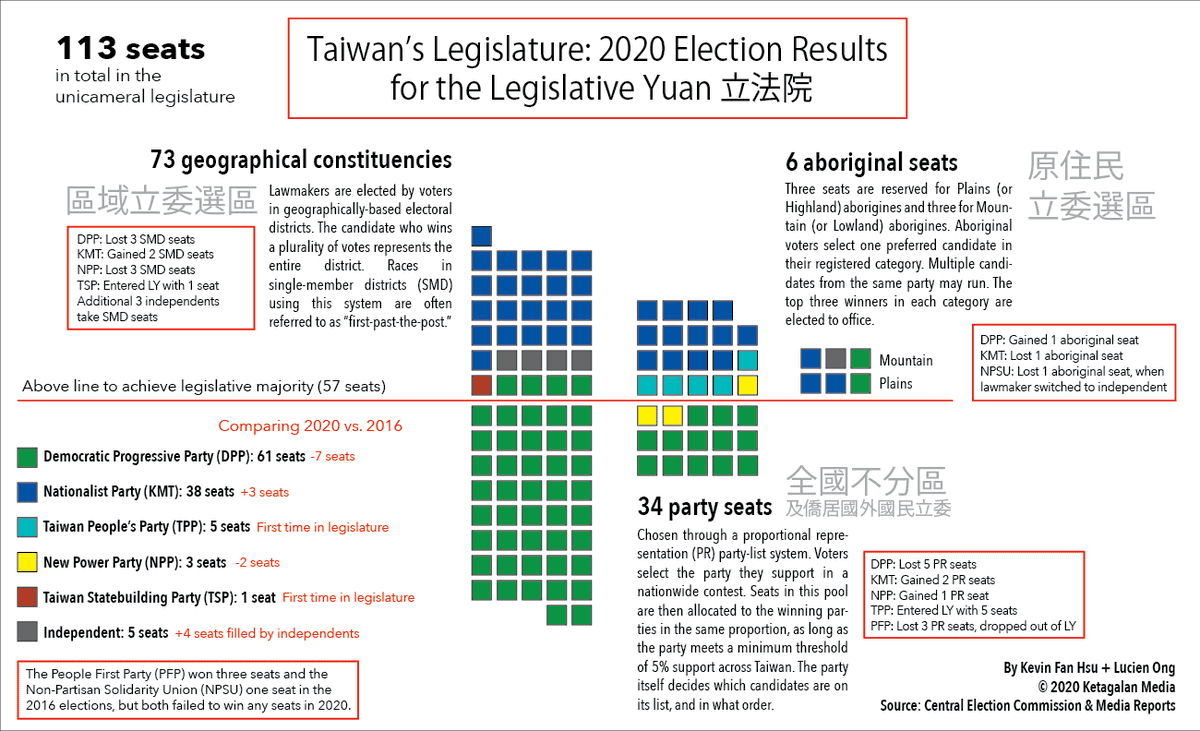A big win for Tsai Ing-wen and Taiwanese identity
Tsai Ing-wen won the Taiwan presidency by a landslide on Saturday, beating her primary challenger, Kaohsiung mayor Han Kuo-yu, by 2.7 million votes (57.1 to 38.6 percent). The 8.2 million votes Tsai received was the most ever in the island’s seven direct presidential elections.

“Tsai Ing-wen (蔡英文 Cài Yīngwén) will be reelected as Taiwan’s president with ‘an overwhelming majority,’” we predicted in Friday’s newsletter (and our 2020 Red Paper). Indeed, Tsai won by a landslide on Saturday, beating her primary challenger, Kaohsiung mayor Han Kuo-yu (韩国瑜 Hán Guóyú), by 2.7 million votes (57.1 to 38.6 percent). The 8.2 million votes Tsai received was the most ever in the island’s seven direct presidential elections.
James Soong of the People First Party, running for president for a fourth time, finished a distant third. (See Bloomberg’s interactive vote breakdown by district.)
In an election widely seen as a referendum on Taiwan’s identity and the island’s relationship with mainland China, nearly 75 percent of eligible voters (14.5 million) cast ballots. Tsai addressed Beijing directly in her acceptance speech, saying she hopes “that the Beijing authorities understand that democratic Taiwan, and our democratically elected government, will not concede to threats and intimidation.” (Her speech has been translated in full on Focus Taiwan). She added that the election has shown “when our sovereignty and democracy are threatened, the Taiwanese people will shout our determination even more loudly back.”
Kuomintang (KMT) candidate Han Kuo-yu, who advocated closer relations with the People’s Republic of China, was considered a favorite as recently as six months ago, and looked like a shoo-in after Tsai and her ruling Democratic Progressive Party (DPP) suffered sweeping losses during the 2018 midterms. But the tide turned with Beijing’s increasing belligerence toward Taiwan and renewed insistence on “one country, two systems” as a model for reunification, which Tsai and a majority of Taiwan citizens vehemently reject. When the Hong Kong protests broke out over the summer, Tsai was quick to voice her support for the protesters. In framing the elections as a vote about China, she tapped into her supporters’ fears of mainland encroachment, particularly among the island’s young voters, who voted for her in droves.
Meanwhile, Han’s Trumpish, populist rhetoric — to say nothing of the personal attacks on Tsai and disinformation campaigns — proved less effective in these elections than in other democratic elections around the world in the recent past. “Taiwan’s democracy, freedom, and rule of law are the supreme treasures of our national assets,” Han’s concession statement (in Chinese) read.
Beijing reacted to the election results with characteristic saltiness, accusing Tsai and her party of “dirty tactics such as cheating, repression and intimidation to get votes, fully exposing their selfish, greedy and evil nature” (Xinhua: English, Chinese). Nationalistic rag Global Times quoted a research fellow in Shanghai as accusing Tsai of appealing to emotions: “Young people, who are usually a little sensitive on the economy, are easily instigated. As a result, the DPP gained historical support of the Taiwan youth.”
Foreign Ministry spokesperson Gěng Shuǎng 耿爽 had some choice words for the international community, beseeching countries to adhere to the “one-China principle” and “support the just cause of Chinese people to oppose the secessionist activities for ‘Taiwan independence’ and realize national reunification.” He added a customary note about Taiwan being China’s “internal affairs” (Xinhua: English, Chinese).
Jude Blanchette, the Freeman Chair in China Studies at the Center for Strategic and International Studies in Washington and a repeat Sinica Podcast guest (on neo-Maoists, nationalism, the 19th Party Congress, Xi Jinping, China’s “new Red Guards,” and the ongoing Hong Kong protests), doesn’t expect Beijing to use the election results as an opportunity for self-reflection. “I thoroughly expect that the conversation right now in Beijing is about turning the screws even more,” he told Reuters.
All 113 seats in Taiwan’s Legislative Yuan were also up for grabs on Saturday. The DPP lost seven seats but retained its majority, securing 61 seats against the KMT’s 38. Here’s a handy graphic via Ketagalan Media:

Also see:
Election day in pictures — Focus Taiwan
Han Kuo-yu will return to the southern city of Kaohsiung, where a recall campaign to remove him as mayor awaits. Han was elected in November 2018 but announced a three-month leave last October to focus on his presidential campaign, opening himself to criticism for “abandoning” the city. On Saturday, Han lost by nearly 28 points to Tsai in Kaohsiung. — SCMP
U.S. Secretary of State Mike Pompeo congratulated Tsai by lauding “her commitment to maintaining cross-Strait stability in the face of unrelenting pressure” — Reuters
“Taiwan’s leader meets with U.S. official after election win” — Associated Press
William Lai (赖淸德 Lài Qīngdé), who was elected on Tsai’s ticket, will be vice president. He was Tsai’s opponent in the primaries at one time, but is now tipped to be the DPP’s presidential candidate in four years (presidents in Taiwan have a two-term limit) — SCMP
What are the “prospects and implications for China and the United States” of the election results? — Brookings
Tsai Ing-wen’s victory was also a win for cats:
I love how President Tsai defied misogynistic attacks, leaned into her single, “cat lady” image in the #Taiwan2020 campaign AND WON BY A LANDSLIDE! Pics h/t @lnachman32 @billbirtles #TaiwanElection pic.twitter.com/AxlynMv4cc
— Dr. Leta Hong Fincher 洪理达 (@LetaHong) January 11, 2020
the HK Cat Society congratulated the First Cats of Taiwan on their re-election and on their continuing success of controlling Taiwan thru manipulation of the cat-slave president (h/t @gracehw) pic.twitter.com/OTJWr4Ha4y
— isabella steger (@stegersaurus) January 12, 2020





